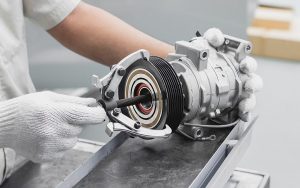A vehicle’s air conditioning or air suspension compressor plays a crucial role in maintaining comfort and performance. However, when it begins producing unusual noises — from rattling and buzzing to grinding or hissing — it’s often a clear sign that something isn’t right. Understanding what these sounds mean can help you detect early issues, avoid expensive repairs, and extend your compressor’s lifespan.
In this guide, we’ll break down the most common compressor noises, their potential causes, and practical ways to troubleshoot each one.
Why Compressor Noise Matters

A properly functioning compressor should operate quietly, producing only a soft hum when running. Any irregular sound typically indicates wear, damage, or system imbalance. Ignoring these early warning signs can lead to:
-
Reduced cooling or suspension performance
-
Increased energy or fuel consumption
-
Premature compressor failure
-
Contamination of the entire system
By learning to identify the meaning behind different noises, you can act quickly before the problem becomes serious.
Common Compressor Noises and Their Causes
Below is a table summarizing the most frequent sounds a compressor may produce, along with likely causes and recommended actions.
| Noise Type | Possible Causes | What It Means / Recommended Action |
|---|---|---|
| Clicking or Ticking | Worn relay, loose mounting bolts, clutch cycling | Check electrical connections and compressor clutch; tighten bolts |
| Hissing | Refrigerant leak, pressure relief valve activation | Inspect hoses, seals, and fittings for leaks; never ignore constant hissing |
| Grinding or Screeching | Worn bearings, damaged clutch, or internal wear | Stop using system; bearing failure can seize compressor |
| Buzzing or Vibrating | Loose components, excessive pressure, or electrical issues | Tighten mounts, check refrigerant levels, inspect wiring |
| Knocking or Banging | Loose pistons, internal damage, or improper lubrication | May indicate severe internal failure; replacement likely required |
| Whining | Worn pulley or belt misalignment | Inspect drive belt tension and alignment |
| Rattling at Start-Up | Low oil or refrigerant, weak clutch | Check system oil and refrigerant charge; top up as needed |
Step-by-Step Guide to Diagnosing Compressor Noise
Step 1: Identify the Noise Source
Before assuming the compressor is the culprit, confirm where the sound originates. Use a mechanic’s stethoscope or a long screwdriver to listen closely. Sometimes, noises come from nearby components like the condenser fan, belt tensioner, or alternator.
Step 2: Observe When the Noise Occurs
Timing helps narrow down the cause.
| When the Noise Appears | Likely Cause |
|---|---|
| Only when AC is on | Compressor clutch, internal valve, or refrigerant issue |
| At startup or shutdown | System pressure equalization or oil flow |
| Constantly during operation | Worn bearing or internal component damage |
| After long inactivity | Oil separation or moisture contamination |
If the noise only appears when the air conditioning or suspension engages, focus on the compressor and its clutch system.
Step 3: Inspect External Components
Perform a visual check for loose bolts, damaged mounts, or worn drive belts. A vibrating or misaligned belt can amplify noise and stress the pulley.
Checklist:
-
Tighten mounting bolts
-
Check pulley alignment
-
Inspect belt for cracks or glazing
-
Examine wiring connectors and relay
Detailed Look: What Each Sound Can Tell You
1. Clicking or Ticking
A rhythmic clicking sound often comes from the compressor clutch engaging and disengaging. Rapid cycling may indicate low refrigerant levels or a faulty pressure switch.
Fix:
-
Verify refrigerant charge
-
Inspect clutch coil and relay
-
Replace any damaged connectors
2. Grinding or Metallic Noise
Grinding is one of the most serious warning signs. It usually points to internal bearing wear or metal fragments circulating inside the compressor.
Fix:
-
Stop the system immediately
-
Flush the refrigerant circuit
-
Replace the compressor and filter drier
3. Hissing or Bubbling
If you hear a brief hiss after switching off the engine, it’s normal — that’s the refrigerant equalizing pressure. But a continuous hiss or bubbling means a refrigerant leak or valve malfunction.
Fix:
-
Apply leak detector spray to fittings and joints
-
Replace damaged O-rings or seals
-
Recharge the system with the proper refrigerant type
4. Buzzing or Vibrating
Buzzing sounds can result from high system pressure, electrical interference, or loose brackets. Excessive vibration is also a sign of internal imbalance.
Fix:
-
Check system pressures with gauges
-
Inspect condenser fan for debris
-
Tighten compressor and hose mounts
5. Knocking or Thudding
These noises suggest the internal pistons or rods are striking due to lubrication failure or wear. Continuing to operate in this condition may destroy the compressor entirely.
Fix:
-
Drain and inspect compressor oil
-
Replace compressor if knocking persists
Preventive Maintenance Tips
Proper care helps reduce compressor noise and extend system life.
Maintenance Checklist:
-
Change receiver-drier or accumulator every 2 years
-
Run the AC for 10 minutes weekly, even in winter, to circulate oil
-
Check for leaks or corrosion around connections
-
Maintain correct refrigerant level
-
Replace serpentine belts on schedule
When to Replace the Compressor

If you’ve followed diagnostic steps and the noise persists, replacement is often the safest and most economical solution. Severe internal wear or contamination can cause recurring problems even after minor repairs.
Signs it’s time to replace:
-
Grinding or knocking continues after maintenance
-
Visible oil or refrigerant leaks
-
AC or suspension performance drastically reduced
-
System repeatedly triggers pressure relief valve
Choosing a Replacement Compressor
When selecting a new unit, always choose OEM-quality or certified aftermarket parts designed for your vehicle model. Look for corrosion-resistant housings, pre-lubricated seals, and warranty coverage.
To ensure durability and proper fitment, you can Buy compressor online from trusted brands that meet or exceed original specifications. Purchasing from a reputable supplier guarantees performance, compatibility, and long-term reliability.
Conclusion
Compressor noise is more than an annoyance — it’s your system’s way of signaling potential trouble. By learning what different sounds mean and responding promptly, you can prevent major failures, save on costly repairs, and maintain consistent comfort on the road.
Regular inspection, correct maintenance, and quality replacement parts will ensure your compressor operates quietly and efficiently for years to come.
If your current unit shows persistent symptoms or severe wear, don’t wait for a breakdown — Buy compressor online and restore smooth, silent performance today.